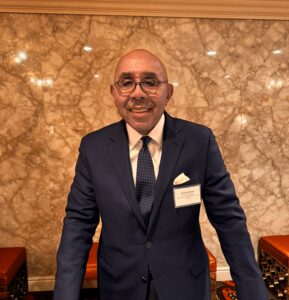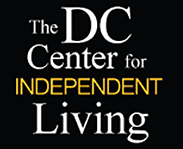 Richard Allen Simms is the Executive Director of the District of Columbia Center for Independent Living, Inc. Mr. Simms is a native of Elkins, West Virginia where he attended public schools and undergraduate school. Prior to assuming the leadership role at the Center, Mr. Simms had a long and successful career in non-profit management in the disability field, and in private sector business management.
Richard Allen Simms is the Executive Director of the District of Columbia Center for Independent Living, Inc. Mr. Simms is a native of Elkins, West Virginia where he attended public schools and undergraduate school. Prior to assuming the leadership role at the Center, Mr. Simms had a long and successful career in non-profit management in the disability field, and in private sector business management.
Mr. Simms received a Bachelor of Arts from Davis and Elkins College; Elkins, WV, a Master of Arts from California State University at Los Angeles and a Master of Public Administration from New York University; NY, NY.
Mr. Simms began professional his career at the Columbia Lighthouse for the Blind in Washington, DC as a Mobility Instructor and Director of Rehabilitation Services. After graduate school, he worked at The Stockton Community Center for the Blind as a Community Mobility Specialist and later at the New York Association for the Blind as Supervisor of the O&M Department and Supervisor of All Instructional Services. He moved downtown to the American Foundation for the Blind to become a Community Organizer and Director of the Northeast Regional Office serving New England, New York and New Jersey. He worked in the restaurant industry as regional manager and as an owner/operator.
Mr. Simms’ affiliations over the past decade include:
- Treasurer of the National Board of Directors for the Religious Coalition for Reproductive Choice
- American Society for Public Administrators (ASPA)
- Council of Minority Public Administrators (COMPA)
- NYU Alumni Association
- Cal State University @ L.A. Alumni Association
- D.C. State Rehabilitation Council
- DC RSA Medical Advisory Committee
- DC State Independent Living Council
- DC Building Codes and Advisory Committee
- Mayor’s Committee for People with Disabilities
- President of the DC/MD Chapter of the Association for the Education and Rehabilitation for the Blind and Visually Impaired (AER)
- Fort Stevens Lion’s Club
Mr. Simms is also serves as church treasurer and member of the Board of Trustees at Fellowship Baptist Church, Washington, DC. He is a member of The United States Tennis Association enjoys reading non-fiction, playing tennis and studying chess. Mr. Simms is committed to the belief that: no one should be denied opportunity; everyone should be given the chance to either fail or succeed.
Rev. Patricia Hailes Fears
President
Carl Bartels
Treasure
Michelle Bishop
Jim Dickson
Gloria Hairston
Theresa Travis
Cornell S. Mersiers
*Board meetings are held bi-monthly
- WHAT IS A CENTER FOR INDEPENDENT LIVING (CIL)? Centers for Independent Living (CILs) were founded to embody the values of disability culture and serve as the organizational backbone of grassroots initiatives for the civil and human rights of people with disabilities. CILs vest power in people with disabilities by ensuring they control the services, management and direction of the organization. CILs base their priorities and actions on the belief that people with disabilities have the right to decide how to live, work, and participate in their communities and that we must organize for social change, so that we may as a society do away with the biases that will support a cure, but often not an accommodation that would allow us to participate on an equal basis. In practice, creating an organization for people with disabilities run by people with disabilities changes the value system, the implementation, and the direction of an organization overall.
- WHO IS ELIGIBLE FOR SERVICES? The District of Columbia Center for Independent Living, Inc. (DCCIL) serves all residents of the District of Columbia.
- DO WE PROVIDE HOUSING? No, DCCIL does not provide housing for people with disabilities. We provide housing resources that include an updated list of available accessible housing.
- WHAT IS A DISABILITY? A disability is a physical or mental impairment that substantially limits one or more major life activities. Major life activities include caring for one’s self, walking, seeing, hearing, speaking, breathing, working, performing manual tasks, and learning.
- WHAT ARE THE AGE REQUIREMENTS? DCCIL serves people of all ages.
- DO I HAVE TO LIVE IN DC TO RECEIVE SERVICES? Yes, you must reside in the District of Columbia to receive DCCIL services; however Information and Referral is available to everyone.
- DO WE PROVIDE TRANSPORTATION? DCCIL does not provide transportation to the general public but each request will evaluated on its merits.
- WHAT IS THE DIFFERENCE BETWEEN INDEPENDENT LIVING AND VOCATIONAL REHABILITATION? Independent living is a philosophy which holds that individuals with disabilities have the right to live with dignity and with appropriate support in their own homes, fully participate in their communities, and to control and make decisions about their lives. Vocational Rehabilitation (VR) refers to vocational and rehabilitative services to individuals with mental or physical disabilities to help prepare for, secure, regain or retain employment.
- WHAT IS THE ADA? The Americans with Disabilities Act (ADA) is a law enacted by Congress in 1990. The ADA affords civil rights protections to individuals with disabilities that are like those provided to individuals through the Civil Rights Act of 1964. It guarantees equal opportunity for individuals with disabilities in employment, public accommodations, transportation, state and local government services, and telecommunications.
- DOES DCCIL HIRE PEOPLE WITH DISABILITIES? Yes! CILs, by law must have a governing board whose membership constitutes 51% of persons with disabilities and 50% of staff must be people with disabilities.
- IS THERE A COST FOR SERVICES? There is no charge for individuals to receive services from DCCIL.
- IS THERE ANOTHER CENTER FOR INDEPENDENT LIVING IN DC? No, DCCIL is the District of Columbia’s only Center for Independent Living.
- DOES THE CENTER PROVIDE SERVICES FOR PEOPLE WITHOUT DISABILITIES? Yes, DCCIL helps families with relatives or friends with disabilities and provides information and referral to the general public.
